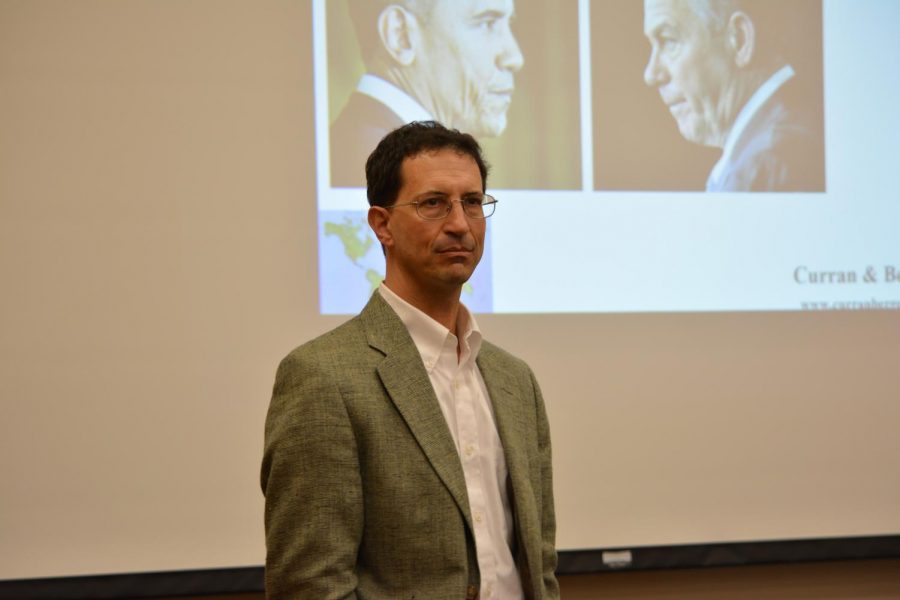The International Programs Office, celebrating their International Education Week, organized an Immigration Discussion Panel with the Graduate School Office of Professional Development last Tuesday at the Goodell Lounge. Attorney Dan Berger, a current partner of the Curran, Berger & Kludt Immigration Law Firm, joined University of Massachusetts students to talk about the implications of living in the U.S. as an immigrant, such as employment visas, looking for permanent residency and applying for a green card.
This event was instigated by the fact that international students in the United States at all levels of education must deal with getting a student visa, then working through Optional Practical Training (OPT) and eventually establishing a more permanent living situation. With immigration laws constantly changing, students need resources that help them through this process.
Bryan Monesson-Olson, who works for the Office of Professional Development, said that he has seen “a lot of struggle from both groups” regarding immigration processes for undergraduate and graduate students. However, he feels happy that UMass can offer these resources to alleviate the burden for students.
In the first part of the panel, Berger explained the process of obtaining a temporary employment-based visa, presenting the H-1B visa as the best option. This choice requires a college degree to apply and is an employer-sponsored visa. People can stay under this visa for three years at a time for up to 6 years, which should be “enough time to figure out if this is a long-term relationship,” Berger said.
Still, “it’s gonna be a challenge for a while,” Berger said as this option also has some downsides. There is a limited quota of 85,000 available visas each year and only 20,000 are allocated for advanced degrees from U.S. universities. Additionally, students are not allowed to work outside of their department, so their job must require a specific degree.
The panelist also explored other temporary work choices. The L-1 visa, also known as an intra-company transfer visa, allows students to work at a company with international offices. It requires them to study abroad for a year and then transfer back to the U.S. He also mentioned the E Visa, which lets you work for a company at least 50 percent owned by people of your nationality but only works for certain countries. Finally, the O-1 visa looks for people with “extraordinary ability in the arts, sciences, education, business or athletics,” Berger explained.
The second part of the presentation focused on permanent residency options for students and workers, mainly on the application process to get a green card. According to Berger, approximately 140,000 green cards are available every year, and only seven percent can go to each country, making the process harder for large countries like China and India.
Berger clarified that applying for a green card should only be an alternative for people who are confident in permanent residency. It is a very rigorous process that requires a “test of the labor market” to show that no U.S. workers are willing, able, qualified and available. Equally important, the employer must pay the first part of the process by law, so workers need their complete support.
There are other alternatives for obtaining permanent residency, such as marriage to a U.S. citizen and applying for asylum because the student is afraid to return to their home country. Berger also mentioned faster tracks for specific cases like outstanding researchers and professors. There is also help for nursing or physical therapy programs, which are both offered at UMass.
After Berger’s presentation, the students were able to ask questions and share their concerns about their specific immigration status. Throughout the discussion, the panelist asked some general questions, to which most of the students responded that they belong to a STEM program and are in the U.S. under an F-1 visa.
At the beginning of the presentation, Berger addressed the reality that “immigration is political in the U.S.” and advised students to ask when hearing any news about immigration policies because significant changes are usually discussed in Congress first, so they cannot happen overnight. Still, many students expressed concern while asking questions about the government’s handling of immigration. Kenneth Reade, the Director for International Student and Scholar Services, said that “there is some potential legislation,” but these changes are usually unpredictable.
After the event, students could reach out to the IPO and Berger’s partners to receive personalized support. Many stood in line, sharing their stories and bonding over similar feelings of stress and uncertainty. Monesson-Olsen said that this panel discussion is a yearly event and it has provided much help for international students at UMass. Students were invited to reach out to the offices that organized the event and join the international students club to build a stronger community.
Paulina Ortiz Orivecan be reached at [email protected].



















